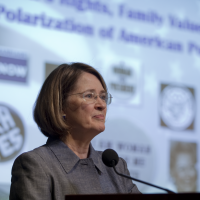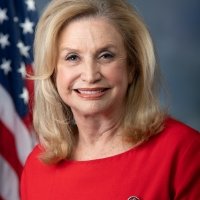Women's Rights, Family Values, and the Polarization of American Politics
On Friday, April 8, 2011, Professor Marjorie Spruill of the University of South Carolina opened the "Women's History in Washington" lecture series with a presentation entitled "Women's Rights, Family Values, and the Polarization of American Politics." Co-sponsored by the Wilson Center and the National Women's History Museum, the series will highlight the research being done in the field of women's history—research that will form the backbone of the planned museum once it opens.
Introducing the lecture, Joan Wages, a founding board member and current president of the National Women's History Museum, noted the steps that must take place before construction of the museum can get underway, beginning with Congressional approval for the purchase of a plot of land on the National Mall that has been designated as the site for building. Pointing to the outstanding accomplishments of women throughout American history and the immense efforts that have already gone into pursuing the project, Wages declared "not only is [the museum] a dream come true for historians, but, I think, for all women in this country."
Spruill's lecture, based on her book in progress, highlighted the transformation of American political culture in the 1970s and the "origins of the highly partisan, deeply polarized political climate we now inhabit." She described the UN International Women's Year conferences that were held in the United States during 1977 and noted that they served to galvanize interest in gender issues among social conservatives as well as feminists.
The capstone of the IWY conferences was the National Women's Conference, held in Houston in November of 1977. Influenced by widespread support among politicians for the Equal Rights Amendment (ERA), the conference drew an astonishing 20,000 people, ranging from elected delegates and students to homemakers and celebrities. Unaware that one outcome of the conference would be backlash, feminist leaders believed that the event would increase awareness of and inspire debate on family and gender issues.
Although both feminists and conservatives at the conferences were confident in their respective arguments, Spruill believes the "IWY conferences produced no definitive victory for either side. Rather, the IWY conflict ushered in a new era in American politics." While opposition to the IWY by conservatives increased throughout the 1970s, women's rights issues became a leading topic on the national agenda as IWY participants "moved the movement" beyond its white middle-class base.
By the 1980s, feminists began to encounter many political disappointments and challenges. The women's rights planks in Democratic and Republican Party platforms revealed the nation's extreme polarization. Conservatives found their "champion" in Ronald Reagan, who led the Republican Party to reverse its forty-year history of support for the ERA. The defeat of the ERA, Spruill noted, was a huge symbolic blow to the women's rights movement, leaving many people with the impression that the movement had failed."
But the issues have not gone away. Revisiting details of the 2008 presidential election, Spruill emphasized that the IWY conferences "propelled gender issues to the front and center in the nation's politics," where they remain a significant influence in local, state, and national government.
Closing the event, Representative Carolyn Maloney (D-NY) outlined the twelve-year campaign to obtain Congressional approval for the National Women's History Museum. She shared personal examples of "heroic achievements" of the women's movement, citing Geraldine Ferraro's nomination as the first female Vice Presidential candidate in 1984, and Hillary Clinton's 2008 presidential campaign (which, in Maloney's words, "put 18 cracks into that glass ceiling").
Maloney also emphasized the current relevancy of the discussion to debates on Capitol Hill over a series of riders concerning abortion and family planning in the upcoming federal budget. Emphasizing the importance of the IYW conferences, Representative Maloney expressed her certainty that efforts made in the 1970s forever changed family values and American politics.
By: Andrew Bedell and Brendan Haggerty
Sonya Michel, Director, United States Studies
Speakers

Professor, History Department, University of South Carolina
